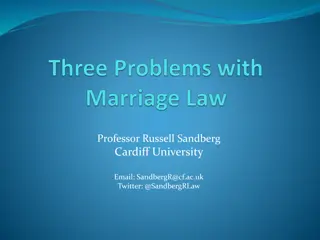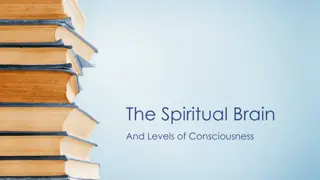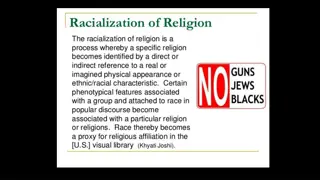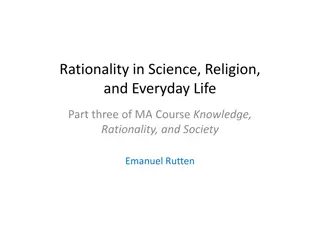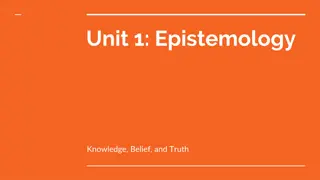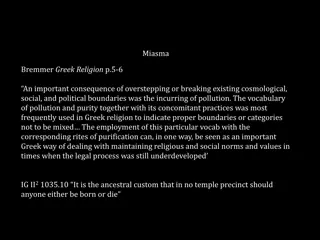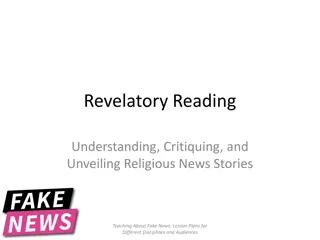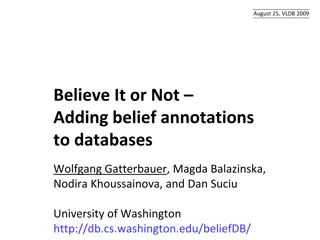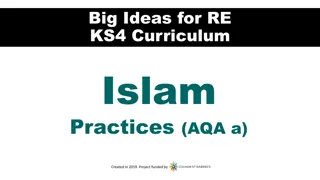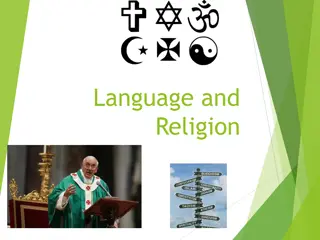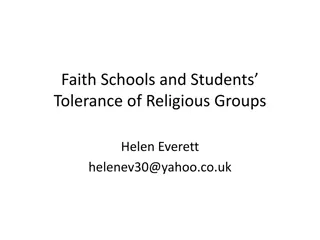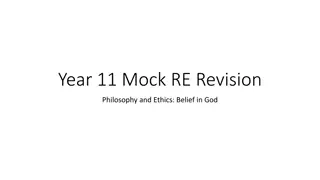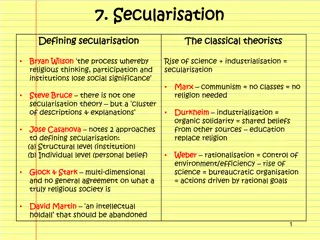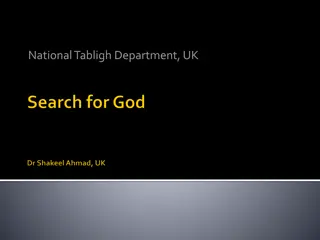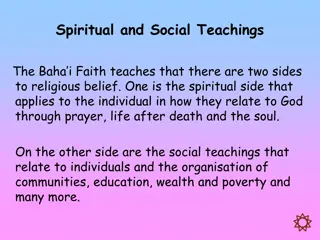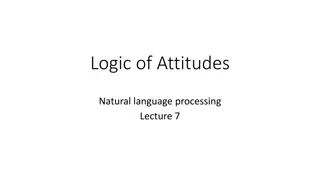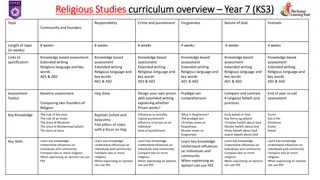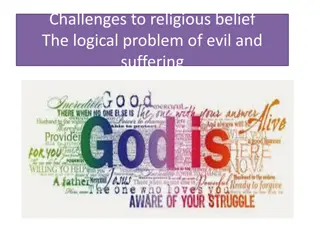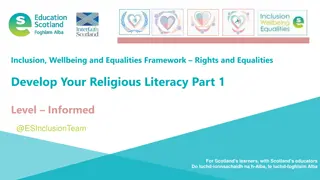Status of Family Laws in India: Hindu vs. Religious Minorities
The family and personal status laws in India vary between Hindu law and those pertaining to religious minorities. While Hindu law has seen extensive reforms, discriminatory provisions still exist. In contrast, laws governing religious minorities have undergone fewer reforms, leading to greater inequ
2 views • 4 slides
Changing Trends in Marriage and Relationships in the UK
Marriage rates in the UK have significantly declined since 1972, with religious ceremonies decreasing to the lowest percentage on record. Cohabitation has increased, and misconceptions about common-law marriage prevail. Various intimate adult relationships now exist outside the Marriage Act 1949, in
1 views • 57 slides
Understanding Religious Conflict: Definition and Types Explored
Religious conflict is a complex and recurring concept throughout history. Scholars have defined it as disagreements between religious groups. This conflict arises from contentious issues touching on ideology, morality, power, and identity, influenced by various socio-political, economic, and cultura
1 views • 13 slides
Evolution of Akbar's Religious Policy: A Historical Overview
In the 16th century, Akbar the Great implemented a revolutionary religious policy in the Mughal Empire. Initially a devout Sunni Muslim, Akbar evolved his stance to promote harmony and equality among all religions, fostering tolerance and understanding. This shift marked a significant departure from
1 views • 25 slides
Exploring Belief Systems and Models of the Universe
Delve into the intricacies of belief systems, levels of consciousness, and various models of the universe. Discover how different perspectives shape our understanding of spirituality, philosophy, and science. Reflect on the usefulness of your belief system and its impact on guiding your life and int
0 views • 33 slides
Embracing Religious Pluralism for a Harmonious Society
Educate yourself on world religions and religious oppression, empathize with religious minorities, combat generalizations, and promote belief inclusion in all aspects of life for a more just and peaceful world.
0 views • 6 slides
Elizabethan Religious Settlement: Unity Amidst Division
Amid religious division in England, Queen Elizabeth I implemented a Religious Settlement in 1559 to unify the country. The settlement, a blend of Protestant and Catholic elements, aimed to maintain peace and prevent rebellions. Elizabeth's strategic compromise pleased most people, though lingering t
0 views • 14 slides
Understanding Secularism: Principles and Advantages
Secularism is the principle of separating government institutions from religious entities to ensure equal rights for believers and non-believers. It safeguards freedom of religious belief and practice, upholds religious freedom, and promotes democracy and fairness. Secularism aims to prevent religio
0 views • 21 slides
Rationality in Science, Religion, and Everyday Life: Exploring Belief Formation and Rational Decision-Making
Explore the essence of rational belief formation across science, religion, and daily life through the lens of cognitive processes, decision-making, and value systems. Delve into the conditions for rational belief, practical decision-making, and axiological rationality to understand human cognition a
1 views • 142 slides
Understanding Religious Language: Cognitivism vs. Non-Cognitivism in the University Debate
This discussion explores the debate between cognitivism and non-cognitivism in religious language. Cognitivism asserts that religious claims aim to describe the world and can be true or false, while non-cognitivism argues that such claims express attitudes and cannot be verified. Flew's challenge qu
0 views • 9 slides
Exploring Epistemology: Knowledge, Belief, and Truth
Delve into the intriguing world of epistemology through a thought-provoking story of a mouse and cheese. Questions of knowledge, belief, truth, and reasoning are examined, challenging perceptions and understanding. Discover perspectives from various characters in the narrative and ponder the distinc
0 views • 17 slides
Understanding Pollution and Purification in Greek Religion
The concept of pollution and purification played a crucial role in maintaining religious and social norms in ancient Greek society. Breaking boundaries or defying societal expectations could lead to pollution, necessitating purification rituals. Examples of actions that could cause pollution include
0 views • 7 slides
Unveiling Fake News in Religious Contexts: Lesson Plans and Critical Reflections
Explore the intersection of religion and fake news through lessons on understanding, critiquing, and unveiling fake stories in various religious landscapes. Delve into topics like the impact of belief systems, liberation theology, and societal consciousness stages. Uncover the role of critical refle
1 views • 11 slides
Guide to Using the BSA Calendar of Religious Observances
The BSA Calendar of Religious Observances is a valuable resource for scheduling scouting events in consideration of various religious holidays and observances. This guide provides an overview of the calendar, highlights important dates, and emphasizes the importance of respecting religious diversity
0 views • 8 slides
Exploring Religious Beliefs and Social Dynamics in SCLY3: Functionalism vs. Marxism
Delve into the intricate relationship between religious beliefs and social change or stability through the contrasting lenses of Functionalism and Marxism. Unpack the mechanisms by which belief systems impact societal structures and the dynamics of change or preservation. Gain insight into how these
1 views • 58 slides
Managing Belief Annotations in Databases: A Modal Logic Approach
Explore the concept of belief databases that enable data curation based on modal and default logic in a relational model. The work discusses managing inconsistent views in community databases and presents a motivating application scenario to illustrate the challenges and solutions in handling belief
0 views • 34 slides
Understanding Islam: Big Ideas for KS4 Curriculum on Islamic Practices
Explore the key concepts of Islam such as Shahadah, salat, and sawm within the context of belief and action. Delve into the significance of these practices in Muslim belief and debate whether Islam is primarily about belief or action. Engage in thought-provoking discussions on the importance of Shah
0 views • 4 slides
Understanding the Role of Language in Religion
Exploring the significance of language in religious contexts, this content discusses the functions, features, lexicon, grammar, and metaphorical aspects present in religious language. It delves into how religious language upholds spiritual beliefs, persuades believers, and expresses specific attitud
0 views • 8 slides
Understanding the Cultural Dimensions of Food and Religious Influences in Culinary Arts
Explore the impact of religious beliefs on food traditions and dietary restrictions across different cultures in the culinary world. Learn about the influence of major world religions on eating habits, food choices, and culinary practices. Discover how various religious groups, such as Christians, o
0 views • 26 slides
The Vital Role of Religious Institutions in Supporting Immigrants
Religions and immigration are interlinked in modern societies, where religions play a significant role in providing services, defending rights, and supporting the social cohesion of immigrants. Mainstream religious institutions serve as key actors in offering assistance, advocating for migrant right
2 views • 14 slides
Understanding Religious Language: Flew, Hare, Mitchell
Exploring the contrasting views of cognitivism and non-cognitivism in the context of religious language through the perspectives of Flew, Hare, and Mitchell. Delve into Flew's challenge on the undetectable gardener, Hare's concept of bliks, and Mitchell's response to the rationality of religious bel
0 views • 7 slides
Understanding Religious Tolerance in Schools: Insights from Research
Exploring the levels of religious tolerance among students in different types of schools such as Roman Catholic, Evangelical Christian, Muslim, and Non-Faith institutions. The research considers factors influencing students' attitudes towards diversity and highlights varying levels of active toleran
0 views • 15 slides
Religious Accommodation in the Army: Advising Command
The content discusses the role of the Chaplain Corps in advising Soldiers and leaders on religious accommodation in the Army as of February 13, 2019. It covers learning objectives, legal foundations, Army policies, procedures, recent changes, and references related to religious accommodation. The in
0 views • 36 slides
Understanding Religious Discrimination Laws in California Workplace
Learn about the regulations and protections under FEHA and Title VII in California, including religious exemptions, accommodation requirements, case studies, and best practices to address discrimination issues effectively. Discover the statistical insights on religious discrimination complaints and
0 views • 45 slides
Importance of Revelation in Catholic Belief
Catholics value revelation as a means through which God reveals aspects of His nature. Natural revelation points to God's existence through the world, while special revelation is seen in the Bible. Jesus Christ is central to Catholic belief as the ultimate revelation of God, showing His love, forgiv
0 views • 13 slides
Understanding Secularisation: The Decline of Religious Influence in Society
Secularisation refers to the process in which religious thinking, participation, and institutions lose their social significance. This phenomenon is influenced by factors such as the rise of science, industrialisation, changing social attitudes, and the disengagement of the church from society. Evid
0 views • 8 slides
Philosophers' Views on Religious Experience: Insights and Critiques
This lesson delves into the perspectives of various philosophers such as Rudolph Otto, Richard Swinburne, John Hick, and Michael Persinger on religious experiences. It explores concepts like the numinous, religious knowledge, God's existence, and criticisms on the validity of religious experiences.
0 views • 7 slides
Philosophers' Views on Religious Experience: Insights from William James
Explore William James' perspective on religious experiences, including his views on existential and value judgments. Understand how James argued for the validity of religious experiences and their potential proof of God's existence. Delve into the implications of emotions and prior beliefs on interp
0 views • 7 slides
Religious and Social Conflicts Fueling the Rise of Absolutism in Europe
Social, economic, and religious conflicts in Europe played a significant role in the emergence of absolutism where monarchs wielded supreme power without sharing it with legislative bodies. Events like Spain's religious conflicts, Protestantism in England, the Spanish Armada, religious conflict in t
0 views • 10 slides
Religious Pluralism and Civil Society: A Paradox in Government Control
Understanding the intricacies of religious pluralism in the context of government control reveals a paradox where restricting religion can hinder social cohesion and economic growth. Through insights on the counterproductivity of control, the role of religious organizations in civil society, and the
0 views • 16 slides
Insights on Belief, Religion, and Human Nature from National Tabligh Department, UK
Explore the rationality behind belief, the essence of personal relationship with God, the significance of helping those in need, and the complexity of faith in the context of societal and individual growth. Delve into the evidence supporting belief, the historical presence of spirituality across glo
0 views • 32 slides
Exploring the Fine-Tuned Universe and Belief in God
The discussion delves into the concept of the fine-tuned universe and the belief in God from a Christian perspective. It contrasts reasons for belief with challenges posed by atheistic viewpoints. The content covers responses to skepticism and insights into the Big Bang theory, fundamental forces, a
0 views • 26 slides
The Spiritual and Social Teachings in Religious Belief
The Baha'i Faith emphasizes the dual aspects of religious belief: the spiritual side focusing on the individual's connection to God, prayer, and the soul, and the social teachings relating to community organization, education, wealth, and poverty. Various forms of worship have been expressions of hu
0 views • 27 slides
US Religious Freedom Restoration Act (RFRA) Overview
The US Religious Freedom Restoration Act (RFRA) aims to protect the free exercise of religion by ensuring that governments do not substantially burden religious practices without compelling justification. It emphasizes striking a balance between religious liberty and governmental interests through t
0 views • 9 slides
Understanding Propositional and Notional Attitudes in Logic and Natural Language Processing
Explore the intricate concepts of propositional and notional attitudes in the context of logic and natural language processing. Dive into the distinctions between belief, knowledge, seeking, finding, solving, wishing, and wanting within the realms of individual intensions and hyper-intensions. Under
0 views • 16 slides
Religious Studies Curriculum Overview for Year 7 and 8 (KS3)
Explore various topics such as responsibility, crime and punishment, forgiveness, nature of God, festivals, community, founders, worship, creation, life after death, rules and laws, relationships in this detailed Year 7 and 8 (KS3) Religious Studies curriculum. The curriculum includes assessments, e
0 views • 6 slides
The Logical Problem of Evil in Religious Belief
The logical problem of evil questions how a God who is omnipotent, omniscient, and omnibenevolent could allow evil and suffering to exist in the world. Epicurus' formulation challenges the traditional views on God's attributes and raises questions about why such suffering exists despite the belief i
0 views • 24 slides
Future of Equality Law at Work: Race, Religion, & Belief (October 2017)
Explore the future of race, religion, and belief discrimination post-Brexit, focusing on case law developments. Delve into the origins of discrimination laws, including Equal Treatment Directive 2000/78 and Equality Act 2010. Dive into Article 9 of the ECHR, examining the right to freedom of thought
0 views • 12 slides
Developing Religious Literacy for Educators in Scotland
This resource aims to enhance educators' understanding of religious literacy by exploring religious discrimination, core beliefs of major faiths, and additional learning sources. It encourages educators to consider the needs of learners in relation to their religious beliefs in Scotland.
0 views • 30 slides
Settling the Northern Colonies: Religious Transformation and Colonization
The Protestant Reformation led to the emergence of Puritanism in the Northern Colonies, with figures like Martin Luther and John Calvin shaping religious beliefs. The Massachusetts Bay Colony stood as a beacon of self-government and religious ideals, while dissenters like Anne Hutchinson and Roger W
0 views • 9 slides

